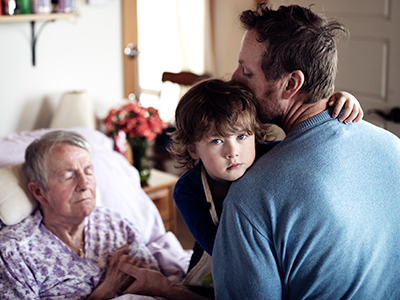Unpaid caregiver challenges and supports
People caring for seniors with dementia put in more hours, are more likely to feel distress

Unpaid caregivers of seniors with dementia put in more hours and experience higher levels of distress than those providing care for other seniors.
Defined as family members, neighbours and friends who take on an unpaid caring role to support someone with a diminishing physical ability, a debilitating cognitive condition or a chronic life-limiting illness,Reference1 these caregivers would benefit from increased community support to help them manage care for both their loved ones and themselves.
“Informal caregivers … sacrifice their own time, finances and health in order to care for a loved one with dementia,” says the National Strategy for Dementia-Friendly Communities. “Caregivers shoulder a tremendous responsibility as they strive to provide the attention and care that is necessary.”Reference2
CIHI’s analysis finds that several key factors affect unpaid caregivers of seniors living with dementia. We spoke with 2 Canadian caregivers whose experiences reflect those findings.
Meet the caregivers
Meet Liz, 68, British Columbia
Liz is a caregiver to her husband, Dave, who has frontotemporal dementia and is also being treated for bladder cancer. Dave’s dementia progressed quickly after his diagnosis in 2012 and his behaviour became too aggressive for Liz to handle on her own at home. He now resides in an assisted-living facility.
Meet Catherine Ann, 41, Newfoundland and Labrador
Catherine Ann cares for her mother, Isabel, who is in the terminal stages of vascular dementia. Catherine Ann is a mother of 2 young children and her husband works outside the province 21 days at a time. Catherine Ann is supported with 62 hours of home care a week.
26
Mean hours per week of informal care provided to seniors with dementia, compared with 17 hours provided to other seniors
45%
Unpaid caregivers of seniors with dementia are more likely to experience distress (45%) than caregivers of other seniors (26%)
1.6×
Caregivers of seniors with dementia have higher odds of reporting distress if the person receiving care displays verbal or physical aggression
$1.4billion
Estimated total out-of-pocket costs paid for by caregivers of people with dementia in Canada in 2016
Caregiver supports
Some key community support resources can provide caregivers with information, help them manage care, and reduce distress and financial burden
More hours of care

CIHI’s analysis finds that caregivers of seniors with dementia provide an average of 26 hours of care each week. This is substantially higher than the 17 hours provided by caregivers of those without dementia.
Most seniors with dementia have a caregiver, and they are unlikely to live alone — only 13% compared with 21% of seniors without dementia. Caregivers of seniors with dementia are primarily children (58%) or spouses (32%).
Unpaid caregivers may find themselves assisting with a range of activities. These include chores, meal preparation and transportation, as well as personal care support with bathing and dressing. Caregivers of those with dementia also take on additional responsibilities, such as providing emotional support, managing challenging behaviour and ensuring their loved ones’ adherence to medication.Reference3
When thinking about the time spent caring for loved ones, Liz and Catherine Ann admitted that the hours of care can be difficult to quantify.
Liz visits her husband twice a week at his assisted-living facility and speaks with him every night on the phone. In addition to making sure he has everything he needs in his apartment and managing his medical appointments, she spends a lot time acting as an intermediary between Dave and the facility staff.
“This was a surprise, because I thought that since Dave was in assisted living, I would be less stressed,” she said.
Catherine Ann’s mother, Isabel, was diagnosed with vascular dementia after she had a stroke in 2008. Isabel hasn’t been able to live on her own since then, and Catherine Ann and her brother co-cared for their mother until 2012. “At the beginning it was really important to her to have meaning and purpose and contribute to the homes she was in. I would call her the house manager. She would do the laundry and clean. She loved doing it.”
Isabel is now in the terminal stages of dementia. Catherine Ann, having cared for her mother through the progress of her disease, has lived through many iterations of caregiving. “It’s not as intense now as it was before. When [my daughter] was younger and mom was more active, sometimes she’d be awake at night and so I could easily spend all night with mom and be up all day with the baby... Now, really, for mom, it’s a different kind of ensuring quality of life. Her speech is very limited so interaction with her means being in the room, but it’s a different kind of time commitment,” she said.
Caregivers experience more distress
According to CIHI analysis, more than 4 out of 10 caregivers (45%) of seniors with dementia exhibit symptoms of caregiver distress — almost twice as many when compared with caregivers of seniors without dementia (26%). 38% of caregivers express the symptoms of distress, anger or depression and 21% feel unable to continue their caring activities (compared with 19% and 12% for caregivers of seniors without dementia, respectively).
Liz’s distress came in the form of a collapse in 2014. She was on stress leave from work at the time, which meant she was at home with her husband, who had become physically and verbally aggressive. “My daughter called me and I couldn’t stop crying. The kids had to come up. Thankfully our adult daughters were in a place where they could come home because they were able to work their jobs temporarily out of office. As a result, they got me back on my feet.”
Liz’s emotional distress has since manifested as physical symptoms, and she is currently taking medication for gastrointestinal problems associated with stress.
“There’s a myth out there that if you just ‘care better,’ things will be okay. And that totally denies the reality of the person. Because you think, he’s my husband of 48 years, I should be able to do this. My stomach is saying, ‘you know what, Liz, you can’t.’”
Between caring for her mother and raising 2 children, Catherine Ann reflected, there have been moments of feeling depleted and having nothing left to give. Living in rural Newfoundland and Labrador also makes it challenging to access care for her own health. To stay healthy, she regularly talks with a therapist on the phone.
Factors associated with caregiver distress
CIHI data identifies the primary drivers of distress among caregivers of seniors with dementia as the following (full details are in the table below):
- Hours of direct care provided weekly — those providing more than 20 hours of care each week had nearly 3 times higher odds of reporting distress, and those providing between 11 and 20 hours had almost twice the odds, compared with those who provide 10 hours or less
- Higher cognitive impairment, mood and behavioural symptoms of people receiving care, including moderate to severe cognitive impairment, depression, anger/conflict, delusions, wandering and responsive behaviours (at least one instance of verbal abuse, physical abuse, socially inappropriate or disruptive behaviour, or resisting care that occurred at least once in the last 3 days)
- Medical instability, poor self-rated health and requiring assistance with activities of daily living of people receiving care
Financial challenges of caregiving

Unpaid caregivers play an essential role in supporting health care infrastructure. Total out-of-pocket costs paid for by caregivers of people with dementia were an estimated $1.4 billion in 2016 and are projected to rise to $2.4 billion in 2031.Reference4 While there are government supports and funding programs available, caregivers pay out of pocket for things such as
- Home modifications
- Professional health care or rehabilitation services
- Hiring people to help with daily activities
- Transportation, travel or accommodation because of caregiving responsibilities
- Specialized aids or devices
- Prescription or non-prescription drugs
Liz and Dave built their life around his nursing pension, but due to his cognitive decline he retired early in 2009, before he was diagnosed with dementia. Now 70% of his net pension covers the cost of his care at the assisted-living facility, which will go up to 80% when he eventually transfers to a long-term care facility. At age 68, Liz works 3 days a week as a social worker in her community in B.C.
“How else am I going to live? We didn’t make a lot of money. We raised 3 kids; we put them through education. Thankfully I love what I do.”
Moving back to her family home in Newfoundland and Labrador was originally a 6-month plan for Catherine Ann and her partner. But soon after they arrived, they found out they were expecting their first child and that her mother was no longer able to travel between Nova Scotia and Newfoundland and Labrador. They decided to stay put and Catherine Ann, who worked in conflict resolution and restorative justice, has not gone back to work.
“We’ve married me being home with mom with us starting our family,” she said. “There are lots of hidden costs associated with that, like the years I’m not paying into a pension and then even how we upgrade our house.”
Caregiver supports
Providing effective support to those living with dementia in the community and to their families is an important component of dementia strategies. If caregivers receive help to better manage the complex needs of the people they care for, hospital visits or transitions to higher levels of care may be improved. In addition, caregivers would be enabled to maintain their caregiving activities and have a personally rewarding experience.
The following are some community support resources where caregivers can get information and help with managing care, and reduce their distress and financial burden:
- Caregiver Resource Hub
- First Link External link, opens in new window
- Respite care External link, opens in new window
- Adult day programs External link, opens in new window
- My Tools 4 Care
- Family Caregiver Centre
Factors associated with dementia patients and caregiver distress
Odds ratios measure the association between factors and caregiver distress. For instance, an odds ratio of 1.2 for wandering means that caregivers of seniors with dementia have 20% higher odds of experiencing distress compared with caregivers of those without dementia.
| Factors | Odds ratio | Lower confidence limit | Upper confidence limit |
|---|---|---|---|
|
Source |
|||
| Patient demographics | |||
| Urban residency | 1.2 | 1.2 | 1.3 |
| Senior with dementia: Sex (male versus female) | 1.2 | 1.2 | 1.2 |
| Senior with dementia: Age 65–79 versus 90+ | 1.1 | 1.1 | 1.2 |
| Senior with dementia: Age 80–89 versus 90+ | 1.1 | 1.1 | 1.2 |
| Function | |||
| Moderate to severe cognitive impairment (Cognitive Performance Scale [CPS]: 3+ versus 0–2) | 1.5 | 1.4 | 1.5 |
| Some to great difficulty with instrumental activities of daily living (Instrumental Activities of Daily Living Scale: 3+ versus 0–2) | 1.3 | 1.2 | 1.4 |
| Dependent for activities of daily living (Activities of Daily Living Hierarchy Scale: 1+ versus 0) | 1.1 | 1.1 | 1.2 |
| Health status | |||
| Any medical instability (Changes in Health, End-Stage Disease, and Signs and Symptoms Scale [CHESS]: 1+ versus 0) | 1.8 | 1.8 | 1.9 |
| Poor self-rated health | 1.4 | 1.4 | 1.5 |
| Falls | 1.2 | 1.1 | 1.2 |
| Renal failure | 1.1 | 1.1 | 1.2 |
| Any incontinence | 1.1 | 1.0 | 1.1 |
| Mood and behaviour | |||
| Possible depression (Depression Rating Scale [DRS]: 3+ versus 0–2) | 1.7 | 1.6 | 1.8 |
| Responsive behaviours (at least one of verbal abuse, physical abuse, socially inappropriate or disruptive behaviour, or resisting care, where the behaviour occurred at least once in the last 3 days) | 1.6 | 1.5 | 1.6 |
| Expressions of anger/conflict with family | 1.4 | 1.4 | 1.5 |
| Delusions or hallucinations | 1.2 | 1.2 | 1.3 |
| Wandering | 1.2 | 1.1 | 1.3 |
| Service utilization | |||
| Respite care/day care/day hospital services use | 1.3 | 1.2 | 1.3 |
| No visiting nursing/home health aide/physical therapy services | 1.2 | 1.2 | 1.3 |
| Any hospital stays/emergency visits | 1.1 | 1.1 | 1.1 |
| No homemaking services | 1.1 | 1.1 | 1.1 |
| Informal support | |||
| Hours of informal care: 21+ versus 10 or less | 2.9 | 2.8 | 3.0 |
| Hours of informal care: 11–20 versus 10 or less | 1.8 | 1.8 | 1.9 |
| Spousal relationship to primary caregiver | 1.4 | 1.3 | 1.4 |
| Receives assistance with activities of daily living | 1.3 | 1.3 | 1.4 |
References
- 1.
- Back to Reference 1 in text
- Carers Canada. Carer facts External link, opens in new window. Accessed May 18, 2018.
- 2.
- Back to Reference 2 in text
- Standing Senate Committee on Social Affairs, Science and Technology. Dementia in Canada: A National Strategy for Dementia-Friendly Communities External link, opens in new window. 2016.
- 3.
- Back to Reference 3 in text
- Alzheimer’s Association. 2017 Alzheimer’s Disease Facts and Figures External link, opens in new window. 2017.
- 4.
- Back to Reference 4 in text
- Alzheimer Society of Canada. Prevalence and Monetary Costs of Dementia in Canada: Population Health Expert Panel External link, opens in new window. 2016.
How to cite:
Canadian Institute for Health Information. Unpaid caregiver challenges and supports. Accessed April 24, 2025.
If you would like CIHI information in a different format, visit our Accessibility page.

